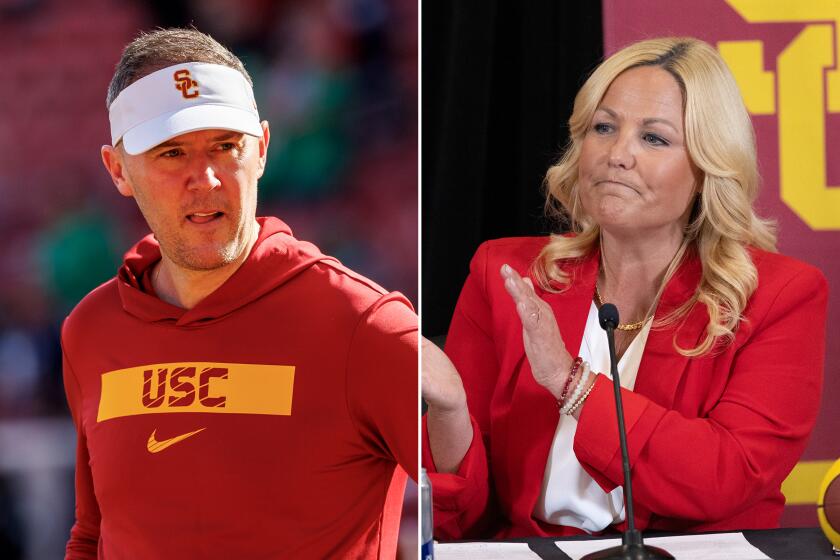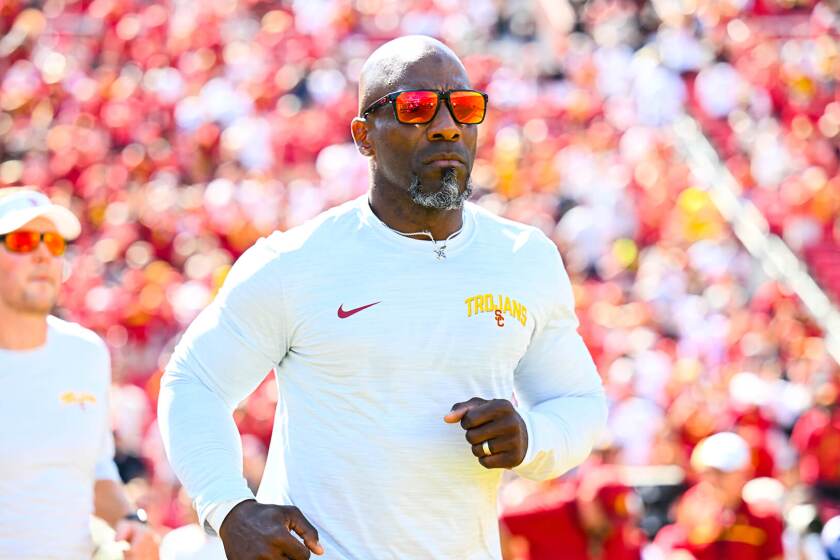Subtext is, NCAA sent a message
- Share via
It comes as no surprise that college coaches ended up abusing what should have been an invaluable technological asset, text messaging, forcing the NCAA to impose a ban on text messages to high school prospects beginning in August.
It probably took lots of practicing for older college coaches to master the art of text messaging, but apparently, a few of the younger generation got a little too exuberant.
When some elite high school prospects are receiving close to 50 text messages a day, that’s bordering on harassment, not to mention imposing an unacceptable financial burden since phone companies, generally, charge for every text message sent or accepted.
It was appropriate last week for the NCAA board of directors to approve, by a 13-3 vote, a ban that will eliminate text messages to recruits and their parents.
“It’s a good thing,” USC football Coach Pete Carroll said. “These kids are not supposed to be contacted as much, and they’re getting contacted. It’s sped up the [recruiting] process a tremendous amount and made for so much more access. This is not what it was designed to be.”
Carroll was no expert at text messaging, but he learned and joined the crowd as the practice evolved into widespread use in the recruiting game.
“It was supposed to be construed as letter writing, but it doesn’t work that way,” he said.
If coaches had only used text messaging as a legitimate communication tool, no ban would have been needed. Parents and recruits appreciated short messages telling them when to call a coach or what time an event was scheduled, but it became too much of a recruiting tool.
“People are telling graduate assistants to text message 300 kids,” said Gary Bernardi, a football assistant at Nevada Las Vegas. “When people take advantage of a good rule, something has to be done.”
Recruits were receiving text messages at all hours, requiring them to spend too much time responding instead of doing schoolwork.
But make no mistake -- text messaging was a critical asset in helping college coaches convince prospects to make early commitments.
Junior tight end Joseph Fauria of Encino Crespi said he expected to wait until the summer or fall to make his college choice, but that changed when he was able to develop relationships with coaches by calling them on the phone after they advised him to do so via a text message.
“I wouldn’t have made a decision if not for texting,” he said.
Fauria committed last month to Notre Dame.
He said he had mixed feelings about the coming ban. He said it will save his family money, but added that he also liked the quick and simple communication with recruiters -- though one morning, he said he spent an hour in written conversation with coaches.
Text messaging isn’t going away completely. Look for high school and club coaches to be the new targets of text messages from college coaches come August. And it will still be permissible for college coaches to send e-mail and participate in instant messaging with recruits.
*
Santa Ana Mater Dei’s new $18-million athletic complex would seem to have everything, from a 3,200-seat gym with two Jumbotron screens to a training room with whirlpools.
But North Hollywood Harvard-Westlake has added something even the Monarchs don’t have -- a dispenser that offers free Gatorade.
On a scorching afternoon, a steady stream of athletes can be found heading to the dispenser next to the P.E. office, grabbing a cup and pushing a button to receive ice cold filtered water or two choices of Gatorade, fruit punch or lemon lime.
The machine cost several thousand dollars to purchase, and the fact no one checks identification means even strangers can drop by for a cool refreshment on a hot day.
“It’s about rehydration,” trainer Milo Sini said.
*
Senior left-handed pitcher Rob Rasmussen of Pasadena Poly continues to be the most dominant baseball player in Southern California.
He struck out 15 on Friday against La Canada Flintridge Prep, giving him 127 strikeouts in 54 innings, a 7-0 record and a 0.39 earned-run average. He’s had games of 20 strikeouts against Glendale, 17 against South Pasadena and 15 against Temple City.
Times staff writer Gary Klein contributed to this report.
More to Read
Go beyond the scoreboard
Get the latest on L.A.'s teams in the daily Sports Report newsletter.
You may occasionally receive promotional content from the Los Angeles Times.







